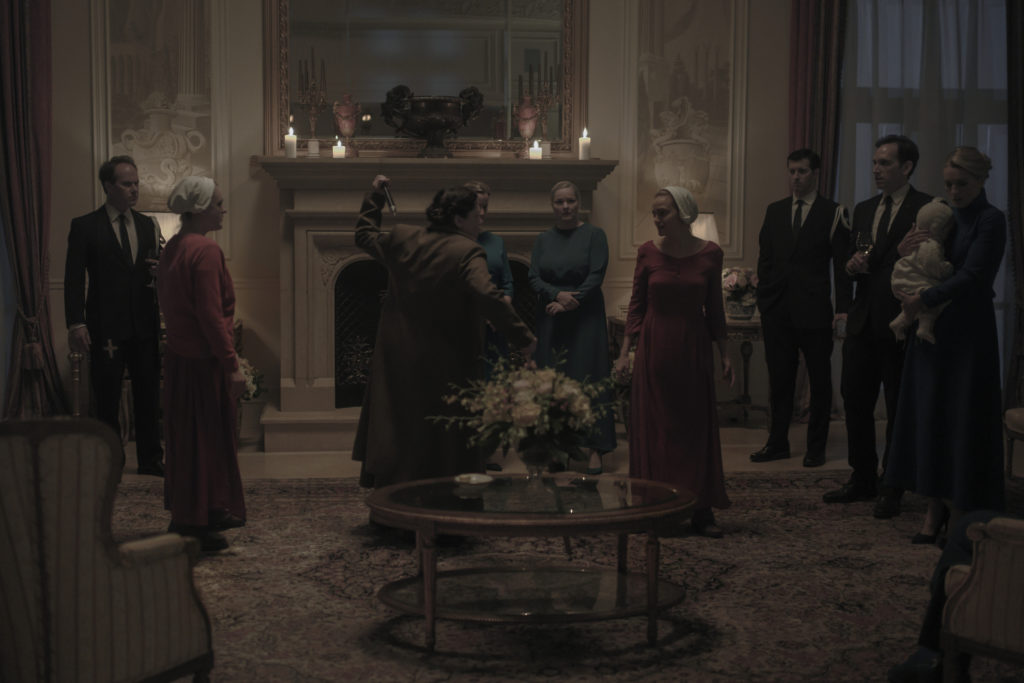The Handmaid’s Tale – S3E4 – God Bless the Child
Posted on June 17, 2019 by Jasmin George in The Handmaid’s Tale – S3 // 0 Comments
Previously, on The Handmaid’s Tale
Over the course of its first two seasons, The Handmaid’s Tale put me – and likely most of its viewers – through an absolute emotional wringer. While watching this show I’ve experienced everything from (deep) sadness to (mild) joy, the heat of raging anger to the delicious satisfaction that comes from revenge, and everything in between. Though I haven’t always been on board with every narrative decision, I’ve always been impressed by this show’s ability to elicit such a breadth of emotions. Which is why I find myself particularly disappointed by the relative numbness I’ve been feeling during the first four episodes of this third season, and “God Bless the Child” may be the biggest letdown of all four.
The entire setup of this episode feels incredibly forced, and most everything that takes place within it leaves a lot of questions in their wake. These questions aren’t the kind where you can have fun with speculation, theorizing, and predictions, either. They’re the kind that seem to be created by plot holes, poor story development, and the writers’/showrunners’ resistance to pick a clear path forward.

For starters, why were the Handmaids even invited to the Putnam home, apart from it being a convenient narrative vehicle for June, Fred, and Serena to have their not-so-secretive conversations? These exchanges had the potential to weave a bit of tension and intrigue into an otherwise slowly-paced hour, had it not been so bizarre to watch June essentially act as the Waterford’s impromptu marriage counselor. Were it not for her main character plot armor, I might question how June managed to roam freely throughout the hallways of this house in the first place. I get it, she’s leading the story, but the privileges she seems to have over other Handmaids and the leniency shown to her by almost everyone has been stretched beyond believability at this point. Ultimately, it weakens the character.
Let’s also consider why the Commanders and their wives suddenly find Aunt Lydia’s brutal treatment of Janine – a woman who had her eye plucked out by the same regime – so very appalling. Perhaps it’s simply to ensure another notch is placed on the Serena-is-softening side of the scoreboard? Mrs. Waterford’s flip-flopping has been difficult to keep track of. How many times are we going to have to watch June put her faith in Serena, only to have the latter reiterate how integral she was to the very creation of this misogynist hellscape? I had truly hoped the stalling of storylines would have been left in the dust with season two, but I guess the show has a little more wheel-spinning left in it.
Is it plausible that Janine would try to be close to her daughter? Or that Serena is a complicated woman who feels extremely unsure about how she should move forward? Or that June would risk her freedom to simply see Hannah one more time? Yes, yes, and yes. But there’s a difference between plausibility, a story that presents something authentic and true to life, and being so realistic it’s boring. Does life happen in a spiral where the same things happen again and again? Yup. But if I wanted to watch real life, I’d shut the TV off and go outside.

The perplexing questions reach beyond Gilead, too, and force me to reconsider my understanding of both Luke and Moira. While I couldn’t fully get behind June and Luke’s decision to baptize Hannah, their reasoning – no matter how loosely constructed by the two – made sense for the times they were living in. For Luke and Moira to baptize Nichole, after seeing the ugliness, pain, and suffering made possible in Gilead under the guise of religion, just doesn’t track. For them to say June would want it to happen is even more eyebrow-raising. This entire plotline played out like a strained attempt at mirroring the present-day happenings in Gilead, but I’m not sure what parallels or contrasts, if any, were properly drawn and explored. I’ve always said THT would benefit from more scenes with Luke and Moira, but this one should have been on the cutting room floor.
Although, perhaps we’re to understand that this is why June admitted to Luke being in the video footage of him and Nichole, presented to Serena and Fred? I’m kidding, of course, but it seems as good a reason as any for her to confirm his identity. I would like to think June’s husband and daughter are safe on the northern side of the border, but who’s to say how far and deep Gilead’s claws have burrowed by now? If the Handmaids and Marthas can start an underground rebellion, why couldn’t Gilead’s leaders have people planted all over the world? June’s decision making is becoming muddier by the moment.
So, it’s a good thing we have Emily because, as heartrending as her story remains to be, there’s no denying how refreshingly different it also is. It’s a shame the Canadian storyline never spent more time on Moira’s reintroduction to normal life, because it’s a pretty darn compelling lens to look through. The Handmaid’s Tale wouldn’t be much of a Handmaid’s Tale without all the action in Gilead, but Emily’s part in this is definitely the most compelling aspect right now, by far. It presents the kinds of questions worthy of spending time to consider.

For starters, how does a family, a marriage, reunite after a separation like theirs? Both Emily and her wife admit to the awkwardness of the situation, even if they do try to shrug it off. How do you navigate these interactions, which used to be normal and where intimacy was so natural, but where certain personal boundaries must now be rightfully respected? Even if Emily’s foremost physical reminder of Gilead is only high cholesterol – should she have a successful clitoral reconstruction, that is – the emotional ramifications of her forced estrangement run deep; they won’t dissipate the moment she sees her wife for the first time. Their reunion is understated and rather perfect for it. Each of Emily’s scenes, in fact, were the kind of authentic that still works as entertainment.
“God Bless the Child” is the kind of episode that makes me hope The Handmaid’s Tale calls it quits after a fourth season. The show’s narrative confines are starting to cave in on themselves and an exit strategy is becoming increasingly necessary. A Handmaid/Martha rebellion, which is slowly but surely bubbling towards the surface, could be the exact strike of the match needed to get this thing back to the truly affecting show we all know it’s capable of being. This rebellion would likely spell the end of Gilead – unless THT really wants to kick us while we’re down – but I’d rather see the show go out in a rapid blaze of glory, than watch it slowly lose its spark entirely.
The Handmaid’s Tale S3E4 Review Score
-
Plot – 6.5/106.5/10
-
Dialogue – 6.5/106.5/10
-
Performances – 8/108/10
"God Bless the Child"
The Handmaid’s Tale – S3E4 – “God Bless the Child” | Starring: Bradley Whitford, The Handmaid’s Tale, Ann Dowd, Elizabeth Moss, Joseph Fiennes, Max Minghella, Yvonne Strahovski , Alexis Bledel
